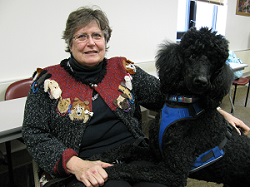Advisor Profile: Nena Murphy-Herd
 "I was lucky to be raised by a mother who was a nurse and a woman who believed in ability," said Mariangeles "Nena" Murphy-Herd. "My mom was an incredible advocate for my experiencing a 'normal' life. She didn't let the doctors sideline me just because I had other needs."
"I was lucky to be raised by a mother who was a nurse and a woman who believed in ability," said Mariangeles "Nena" Murphy-Herd. "My mom was an incredible advocate for my experiencing a 'normal' life. She didn't let the doctors sideline me just because I had other needs."
Murphy-Herd contracted polio when she was 18 months old, and suspects she was born with cerebral palsy (based on her very premature birth in 1947 and descriptions of her physical development as a baby). Now, with arthritis also part of her post-polio experience, she laughed, "I have the trifecta."
As a member of the DHP's Consumer Advisory Board (CAB) and as the sister, cousin, niece and grandchild of physicians, Murphy-Herd is especially attuned to the program's work to educate medical professionals about healthy living for people with disabilities.
"For most doctors, we're a diagnosis. They don't have training on what people can do beyond their disability." However, she found that "if you are proactive about your needs, medical professionals will generally support you."
In one case, a doctor wanted to perform surgery on her knee and another doctor disagreed. The second doctor understood the way her body had adapted to functioning and knew that a surgery supposed to correct her joint to "normal" would actually be counterproductive.
Although surgery helped in other instances, she stressed the value of "shopping around" for physical therapists and physicians who believe a person with a disability can improve, instead of taking the too-common attitude, "This is the body you're stuck with." She worked with one doctor who used Botox and stretching instead of surgery on her foot, which made a lasting difference in her balance, gait and ability to walk.
Dogs are also an important part of Murphy-Herd's proactive approach. She always enjoyed dog training and had a large retriever who learned to help her at home when she fell. After that dog died, her small Standard Poodle, Soda, expressed an interest in helping. Because Soda was very socialized for going into the community, she became Murphy-Herd's first full-time service dog in 2002. That was also the year she started using a wheelchair.
Together she and Soda learned to overcome obstacles that non-disabled planners simply didn't consider, like an electric door opener at her workplace that was located in the middle of a courtyard instead of near the door. Now Tor (for Tornado, pictured above), a larger Standard Poodle, accompanies her on outings as a service dog, in addition to enjoying agility and rally classes with her.
Now retired, Murphy-Herd dedicated her career to working with children with disabilities. Originally from New York City, she came to the University of Kansas (KU) for a position as a rural specialist, working with children with multiple severe disabilities. She also worked for the Capper Foundation, for the State in deaf-blind outreach, and on a grant-funded deaf-blind project at KU.
Murphy-Herd appreciates the people who encouraged her independence. It started with her family, and today, she says, "There is so much I couldn't do if I didn't have my husband's support. I have to thank him for helping every day with my exercises. Life without a support system would be much harder."
She brings this knowledge to her work with the DHP project, where the diverse board members offer many perspectives on how Kansans with disabilities can learn to advocate for their health needs.